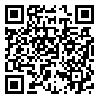Volume 7, Issue 3 (2021)
IEM 2021, 7(3): 197-205 |
Back to browse issues page
1- Department of Biology, Rasht Branch, Islamic Azad University, Rasht, Iran , l.asadpour@yahoo.com
2- Department of Biology, Rasht Branch, Islamic Azad University, Rasht, Iran
2- Department of Biology, Rasht Branch, Islamic Azad University, Rasht, Iran
Abstract: (1320 Views)
Background: Mupirocin is a topical antibiotic inhibiting most Gram-positive cocci. Shortly after taking mupirocin, drug resistance emerges. This study aimed to determine mupirocin resistance in Staphylococcus aureus strains isolated from clinical specimens in Rasht.
Materials & Methods: In this study, a total of 85 clinical isolates of S. aureus were collected. Biofilm formation ability and antibacterial resistance patterns of isolates were investigated. Disc diffusion method and MIC determination were used to determine the susceptibility of strains to mupirocin antibiotic. Agr types, the presence of mupA, and mutation in ileS-1 were evaluated in mupirocin non-susceptible isolates by PCR and PCR sequencing, respectively.
Findings: Out of 85 tested strains, 57 (67%) isolates were recognized as biofilm producers, and all of which showed multidrug resistance phenotype. Agr type 1 was the most commonly detected type. Additionally, 12 mupirocin-resistant strains were identified in the disc diffusion and MIC tests. A total of four strains were mup-A positive and showed high-level resistance. In sequencing and mutation evaluation of the ileS-1 gene in eight low-level mupirocin-resistant strains, 12 types of silent mutation and one type of missense mutation were determined.
Conclusion: The study of mupirocin-resistant strains in this study showed the need to identify factors affecting the occurrence of resistance and to take control and prevention measures before mupirocin losses its efficacy.
Materials & Methods: In this study, a total of 85 clinical isolates of S. aureus were collected. Biofilm formation ability and antibacterial resistance patterns of isolates were investigated. Disc diffusion method and MIC determination were used to determine the susceptibility of strains to mupirocin antibiotic. Agr types, the presence of mupA, and mutation in ileS-1 were evaluated in mupirocin non-susceptible isolates by PCR and PCR sequencing, respectively.
Findings: Out of 85 tested strains, 57 (67%) isolates were recognized as biofilm producers, and all of which showed multidrug resistance phenotype. Agr type 1 was the most commonly detected type. Additionally, 12 mupirocin-resistant strains were identified in the disc diffusion and MIC tests. A total of four strains were mup-A positive and showed high-level resistance. In sequencing and mutation evaluation of the ileS-1 gene in eight low-level mupirocin-resistant strains, 12 types of silent mutation and one type of missense mutation were determined.
Conclusion: The study of mupirocin-resistant strains in this study showed the need to identify factors affecting the occurrence of resistance and to take control and prevention measures before mupirocin losses its efficacy.
Article Type: Original Research |
Subject:
Bacteriology
Received: 2021/03/7 | Accepted: 2021/05/23 | Published: 2021/07/31
Received: 2021/03/7 | Accepted: 2021/05/23 | Published: 2021/07/31
| Rights and permissions | |
 |
This work is licensed under a Creative Commons Attribution-NonCommercial 4.0 International License. |




